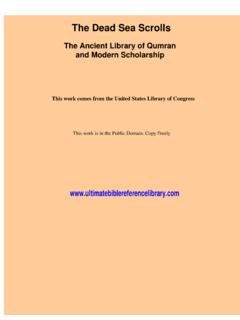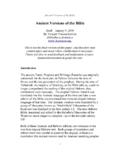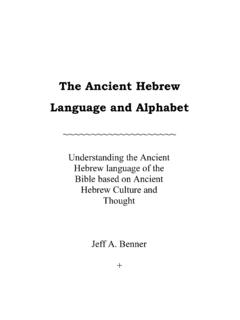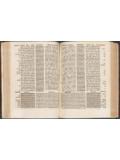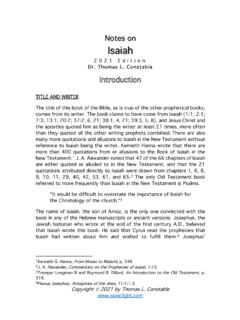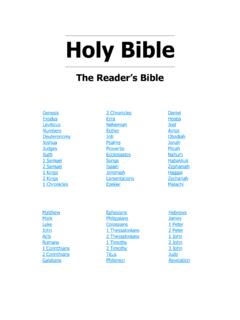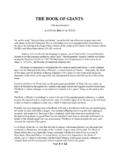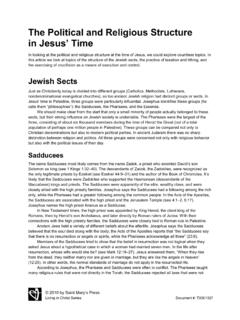Transcription of Catholic vs. Protestant Bibles - Holy Trinity Catholic Church
1 1 Catholic vs. Protestant Bibles By Greg Witherow Catholic Bibles contain Old Testament books not found in Protestant Bibles and as such Catholics are sometimes asked to explain this discrepancy. In this short essay we will briefly cover the differences between the Catholic and Protestant Bibles and the reasons behind those differences. The Books In Question The Catholic bible has seven books and parts of two others in the Old Testament that are not found in Protestant Bibles1. Catholics refer to these books as the Deutercanonical2 books while Protestants refer to them as apocryphal3 books. The books in question are the following: Tobit Judith The Book of Wisdom Sirach (also called Ecclesiaticus) Baruch 1 Maccabees 2 Maccabees Seven chapters in the book of Esther4 Two chapters and a prayer in the book of Daniel5 But how did these books find their way into the Catholic bible and why do Protestants dispute them?
2 To answer these questions we will look at the bible from the time of Christ through the period of the Reformation. 1 The Catholic , Protestant and Orthodox churches all recognize the same 27 books that make up the New Testament. Note that the KJV bible had the apocryphal books in the back of the Old Testament until the early 19th century. They have since been omitted, but KJV Bibles with the apocryphal (deutercanonical) books can still be purchased although they are hard to find. 2 Deutercanonical means second canon; deuter meaning second. For example the book of Deuteronomy, the fifth book of the bible and found in the Old Testament, means second Law.
3 It was the second time Moses had given the Israelites the Law of God; the first time was before the 40 years of wandering in the desert and the second time was after the 40 years of wandering in the desert. They then entered the Promised Land. 3 Apocryphal books are those that are looked to as worthy of historical information but not inspired and therefore not of canonical character. 4 By omitting the chapters found in the Catholic bible , the Protestant book of Esther has the distinction of being the only book of the bible that does not reference God even once. The additional chapters found in the Catholic version contain all the prayers made by Esther and her appeals to God s intervention (chapters 10-16).
4 5 The two additional Catholic chapters of the book of Daniel are Susanna (chapter 13) and Bel and the Dragon (chapter 14) and the prayers of the three children (chapter 3, verses 23 and 24). 2 The Old Testament at the Time of Christ At the time of Christ there was no consensus on a canon of scripture. Instead there were competing Jewish communities with different lists of books they regarded as inspired. No Jewish council had defined a canon of books. The Pharisees revered 39 books, the same 39 found in Protestant Bibles today. Two other groups, the Sadducees6 and the Samaritans recognized only the first 5 books of Moses known as the Pentateuch (Genesis - Deuteronomy).
5 The Essenes were a Jewish sect that held to a third list. The complete list of their revered books is not known; we only know that the list was different7. It should be noted that the groups mentioned here, the Pharisees, Sadducees, Samaritans and the Essenes were geographically centered in Palestine. This is in stark contrast to our last Jewish group that was not only located in Palestine, but also dispersed throughout the known world. They therefore had a more far-reaching influence in their practices. This group was known as the Hellenists, the Greek speaking Jews dispersed throughout the Roman Empire. The Scriptures revered by this group were in the books contained in the Greek Septuagint.
6 The Septuagint was the Greek translation of the Hebrew Old Testament. It was transcribed by 72 translators in Alexandria, Egypt and completed about 150 This Greek translation of the scriptures was needed, as over the centuries the Hebrew language had become a dead language. And as such the Jews of the dispersion needed the scriptures in their vernacular language, namely Greek. The result was a new translation of the bible known as the Septuagint. This Greek bible contains all of the books found in the Catholic Old Testament with some additional books8. Christ, the Apostles and the early Christians used the Septuagint as their primary Old Testament bible . Of the approximately 300 Old Testament quotes in the New Testament, two-thirds of them are quotes from the Septuagint as opposed to the Hebrew Scriptures9.
7 How do we know? Because the wording of the Septuagint is sometimes different from that of the Hebrew bible . A classic example of this is Isaiah 7:14. In the original Hebrew it states that a young woman (Hebrew: almah)10 will bear a child and he shall be called Emmanuel. In the Greek Septuagint it states that a virgin (Greek: parthenos) will bear a child and he shall be called Emmanuel11. Matthew the Apostle, under the inspiration of the Holy Spirit, chooses the Greek Septuagint version of this verse to quote 6 Josephus Antiquities 7 The Book of Enoch (quoted by Jude in the New Testament) and the Book of Jubilees are believed to have been included in the canon of the Essenes.
8 You can go to for more information. 8 In addition to the Deutercanonical books found in the Catholic bible , the books of 1 Esdras, 2 Esdras, 3 Maccabees, 4 Maccabees, the Prayer of Manasseh and Psalm 151 are found in the Septuagint. It should be noted that no new doctrines are introduced in any of these books. Orthodox churches hold that these books (minus 4 Maccabees & Psalm 151) are scripture as most Orthodox regard the Septuagint as inspired. 9 While I ve seen different numbers touted, the point is the vast majority of quotes come from the Septuagint. See the web site as one source. 10 The Hebrew word for virgin is bethoolaw. 11 So which translation is right? The answer is both of them.
9 Mary was both a young woman and a virgin. The theological understanding of the passage that the Greek translators embraced was embraced by the divinely inspired Matthew in writing his New Testament book. 3in Matthew 1:23 where he declares, a virgin shall be with Child in the Christmas story. This is just one of many examples of how it can be determined which Old Testament version is being used by the New Testament writers. The Pharisees Call A Council When the Roman legions burned the Temple during the Jewish Wars in 70 much of the Jewish way of life lay in embers. Gone was the central unifying symbol of Judaism. Furthermore, the Christian faith was threatening Judaism as it was proclaiming that Jesus of Nazareth was the Jewish Messiah.
10 The Old Testament bible of the Christians was the Septuagint and as such, the Jews grew increasingly disenchanted with it12. With the twin threats of the Roman Legions and the Christian faith looming, the Pharisees convened the council of Jamnia towards the end of the 1st century to reaffirm the truths of Judaism. At the council the Pharisees rejected the Septuagint (a Greek language document and increasingly associated by many as a Christian book) and declared that only the Hebrew language books traditionally embraced by the Pharisees would be regarded as divinely inspired13. The resulting Jewish canon contains the list of books Protestants regard as canonical today.
